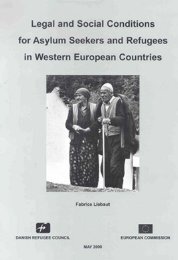Bulgaria - The social impact of seasonal migration
Bulgaria - The social impact of seasonal migration
Bulgaria - The social impact of seasonal migration
You also want an ePaper? Increase the reach of your titles
YUMPU automatically turns print PDFs into web optimized ePapers that Google loves.
12<br />
a) <strong>The</strong> e<strong>migration</strong> <strong>of</strong> <strong>Bulgaria</strong>n Turks was by far the most significant phenomenon in the<br />
early post-war <strong>Bulgaria</strong>n <strong>migration</strong> history (and in <strong>Bulgaria</strong>n <strong>migration</strong> history in<br />
principle). <strong>Bulgaria</strong>n Turks constituted the bulk <strong>of</strong> emigrants in the peak years <strong>of</strong> 1946-<br />
50, and especially in 1966-80. With the ascent <strong>of</strong> Communism in post-war <strong>Bulgaria</strong>, the<br />
<strong>Bulgaria</strong>n government sealed the borders and introduced a ban on free movement.<br />
However, in 1947 Turkey declared that it was ready to accept new Turkish immigrants<br />
from <strong>Bulgaria</strong>. <strong>The</strong> <strong>Bulgaria</strong>n authorities had already started to regard the presence <strong>of</strong><br />
a significant Turkish population with sympathies toward an adjacent ethnic homeland<br />
and a Cold War enemy as potentially harmful for <strong>Bulgaria</strong>. In addition, the European<br />
experience <strong>of</strong> the immediate post-war years seemed to speak in favour <strong>of</strong> permitting<br />
Turkish e<strong>migration</strong>, as millions <strong>of</strong> ethnic Germans, Hungarians, Poles and Ukrainians<br />
had by that point already been "transferred" to their respective states. <strong>The</strong> number <strong>of</strong><br />
<strong>Bulgaria</strong>n Turks to migrate to Turkey had been set during protracted negotiations<br />
between the two states and Turkey opened its border on December 2, 1950. During the<br />
eleven months that it remained open, more than 150 000 Turks left <strong>Bulgaria</strong>, although<br />
another 111 000 who applied for exit visas were not permitted to leave (Ilchev 2000, 245;<br />
Baev / Kotev 1994). A number <strong>of</strong> agreements were concluded in subsequent years in<br />
order to reunite divided Turkish families, and another 110 000 <strong>Bulgaria</strong>n Turks left<br />
between 1968 and 1978 (Kalchev 2001, 133).<br />
b) Jews represented the second biggest post-war e<strong>migration</strong> wave from <strong>Bulgaria</strong>. With<br />
the help <strong>of</strong> eminent <strong>Bulgaria</strong>ns, MPs and the <strong>Bulgaria</strong>n king, the 50 000 <strong>Bulgaria</strong>n Jews<br />
were saved during WWII and did not perish in the Nazi concentration camps2 . Yet 25 000<br />
<strong>of</strong> them were resettled from S<strong>of</strong>ia to the province as a step preparing their would-be<br />
deportation to Poland, a fact that facilitated their decision to emigrate to Israel in 1948.<br />
<strong>The</strong> end <strong>of</strong> WWII radically changed the status <strong>of</strong> Jews in <strong>Bulgaria</strong>. From the most<br />
persecuted minority, they became one <strong>of</strong> the most privileged ones, owing to their active<br />
presence in the anti-fascist struggle and their involvement in the new leftist government.<br />
Although the 25 000 resettled Jews were allowed to return to S<strong>of</strong>ia, their community was<br />
hit by post-war economic destruction, mass unemployment and the state’s inability to<br />
recuperate quickly their lost properties, goods, houses and status.<br />
Two alternative visions <strong>of</strong> the fate <strong>of</strong> the Jewish minority emerged - the Jews<br />
Communists insisted on the integration <strong>of</strong> Jews into the <strong>Bulgaria</strong>n society and the<br />
effacement <strong>of</strong> all traces <strong>of</strong> the fascist anti-Semitic legislation, while the Jews Zionists<br />
campaigned for e<strong>migration</strong> and settlement to Palestine, to a new Jewish state. Between<br />
1944 and 1948, Zionism gained considerable influence among <strong>Bulgaria</strong>n Jews, striving<br />
on post-war destruction and the remnants <strong>of</strong> anti-Semitic feelings. By 1946, from around<br />
50 000 Jews in <strong>Bulgaria</strong>, only 3 000 were not supporting Zionism. In 1947, the <strong>Bulgaria</strong>n<br />
government also changed its anti-e<strong>migration</strong> stance, prompted by the firm position <strong>of</strong><br />
the USSR in support <strong>of</strong> Israel. In September 1948, an E<strong>migration</strong> Commission started<br />
work, guiding the organised e<strong>migration</strong> <strong>of</strong> 32 106 Jews to Israel between October 1948<br />
and May 1949. Before that, around 4 000 Jews - primarily children and youth - had<br />
migrated to Israel to join the anti-Arab fight. By 10 May 1949, the number <strong>of</strong> Jews in<br />
<strong>Bulgaria</strong> was 9 926, which by 1956 dropped to 6 431 persons.<br />
c) Representatives <strong>of</strong> other ethnic groups also left <strong>Bulgaria</strong> after the end <strong>of</strong> WWII.<br />
Czechoslovakia, which had suffered big demographic losses during and after WWII,<br />
including the expulsion <strong>of</strong> the Sudeten Germans, was eager to populate its deserted<br />
2 except for 11 300 Jews from the newly acquired territories in Macedonia and Aegean Thrace

















